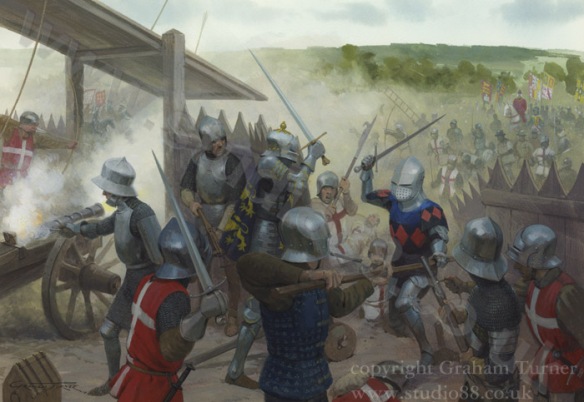Supreme command of all medieval military forces in both France and England was vested in the king, but, because of the temporal length and geographic scope of the HUNDRED YEARSWAR, the royal power of command was often delegated to the Crown’s chief military officers, the constables and marshals. Thus, as the war progressed, the powers, authority, and privileges of these officers grew steadily.
In France, the war saw significant expansion in the powers of the constable. This growth was fueled in part by the ability of some of the men who held the office, and in part by the incapacity of some of the kings they served. During much of the reign of CHARLES V, whose fragile constitution did not allow him to lead armies, the constable was the formidable Breton captain, Bertrand du GUESCLIN (1370-80). During the minority of CHARLES VI, the constable was du Guesclin’s able comrade, Olivier de CLISSON (1380-92), and during much of the FRENCH CIVIL WAR, when Charles was enfeebled by madness, the constables were equally strong figures, Charles d’ALBRET (1403-11, 1413-15) and BERNARD, count of Armagnac (1415-18). Under CHARLES VII, another nonmartial king, the vigorous Arthur de Richemont (1425-58) led the campaigns of reconquest and oversaw the vital military reforms of the 1440s. According to the president of the PARLEMENT, by the time the French retook PARIS in 1436, the constable was “the principal and first office of France in honors and prerogatives, coming before that of chancellor and all others” (Fowler, 119). The office became so prestigious that the dauphin, who was anxious to attract more volunteers from SCOTLAND, rewarded John STEWART, the Scottish earl of Buchan, with it after his victory at BAUGE’ in 1421.
In the absence of the king, the constable had power to make treaties and truces and to grant pardons; by the late fourteenth century, he was a member of the royal conseil prive’, where military policy and strategy were devised. Clisson, for instance, was a strong proponent of avoiding pitched battle, a strategy employed with much success under Charles V. The constable was also entitled to lodging at court and to assist at coronations, where he carried the “Holy Ampule” containing the oil of anointment, and any crimes committed against him were considered crimes against the king’s majesty. When the king was not in the field, the constable had supreme command of the armies, making all troop dispositions, tactical arrangements, and personnel decisions. He sent out all messengers and spies and also decided all garrison assignments and troop detachments. The Crown met all his wartime costs, including replacement of horses for himself and his retinue and double pay of 100 livres tournois per day during sieges and battles. Save for gold and prisoner RANSOMS, he was also entitled to share all booty taken during battle or from captured fortresses.
French marshals commanded the cavalry under the constable and also had responsibility for army discipline and administration. Their chief task was the supervision of troop musters, preparing camps and reviewing troops once in camp. Marshals also dealt with all civilian complaints against soldiers and commanded the army in the absence of the king and constable. They also enjoyed numerous perquisites and were paid 2,000 livres tournois per year. The holders of the marshal’s office were less celebrated than the great constables. Jean de Clermont was slain at POITIERS in 1356, John de Boucicaut was captured at AGINCOURT in 1415, and Pierre de Rieux was captured in 1419. One of the most famous French marshals of the war, Arnoul d’AUDREHEM, who was himself captured at NA ‘ JERA in 1367, had previously served in another high military office, the keeper of the ORIFLAMME, the war banner of French kings. The keeper, who was appointed for life, swore to die before surrendering the banner, an oath that Geoffrey de Charny, JOHN II’s keeper, fulfilled at Poitiers. Another important French military officer was the master of the crossbowmen, who commanded all infantry and ARTILLERY, although, in the fifteenth century, the latter came under the control of the master of the king’s artillery, who, like Jean BUREAU, was more administrator and technician than military man.
In England, the offices of constable and marshal were, unlike in France, hereditary in great noble families, the former residing, up to 1372, with the Bohuns and the latter, after 1385, mostly with the Mowbrays. Even when not held by members of these families, the offices were exercised by great noblemen, never by members of the lesser nobility as occurred in France, for instance, with du Guesclin. During the most active phases of the war, the English had energetic martial kings and princes-EDWARD III, HENRY V, and EDWARD, THE BLACK PRINCE. Their dominance prevented English constables and marshals from attaining the powers and prominence achieved by their French counterparts. Under less martial kings, high military offices were held by relatives; THOMAS OF WOODSTOCK, duke of Gloucester, was constable for his nephew, RICHARD II, and JOHN, DUKE OF BEDFORD, exercised the same office for his nephew, HENRY VI. Other important English military commands usually went to noblemen, such as HENRY OF GROSMONT, duke of Lancaster; WILLIAM DE BOHUN, earl of Northampton; RICHARD BEAUCHAMP, earl of Warwick; THOMAS MONTAGU, earl of Salisbury; and John TALBOT, earl of Shrewsbury. However, command opportunities for talented men of lesser social rank appeared in AQUITAINE and BRITTANY, where virtually constant conflict, particularly during the BRETON CIVIL WAR, allowed such captains as Sir John CHANDOS, Walter MAUNY, Sir Thomas DAGWORTH, Sir Hugh CALVELEY, and Sir Robert KNOLLES to have famous and lucrative military careers.
Further Reading: Allmand, Christopher. The Hundred Years War. Cambridge: Cambridge University Press, 1988; Fowler, Kenneth. The Age of Plantagenet and Valois: The Struggle for Supremacy, 1328-1498. New York: G. P. Putnam’s Sons, 1967; Prestwich, Michael. Armies and Warfare in the Middle Ages: The English Experience. New Haven, CT: Yale University Press, 1996.
